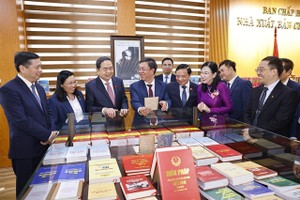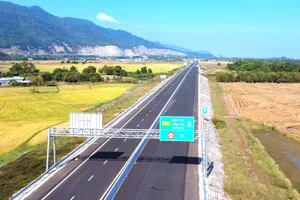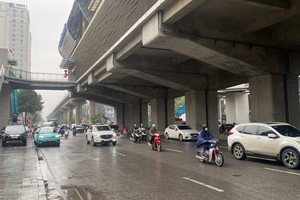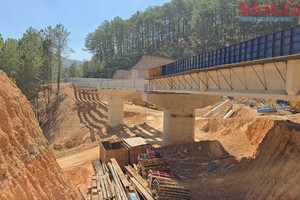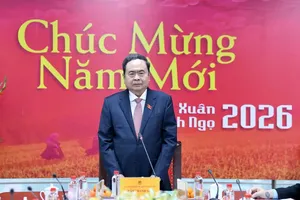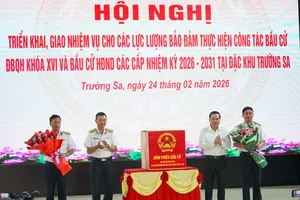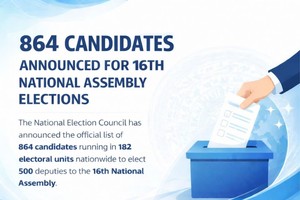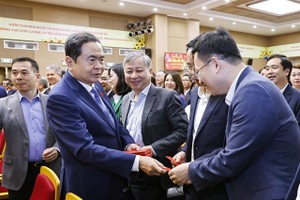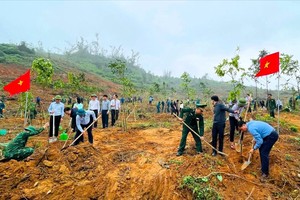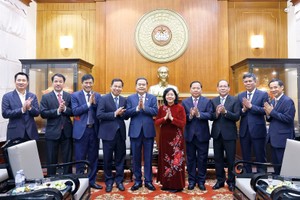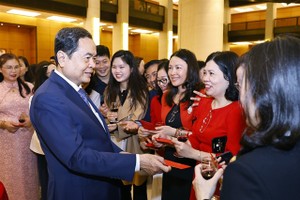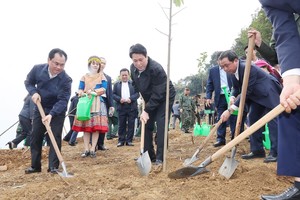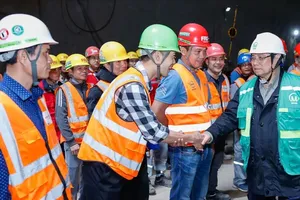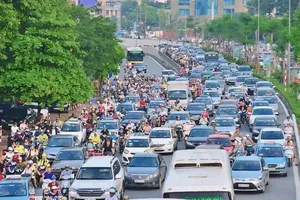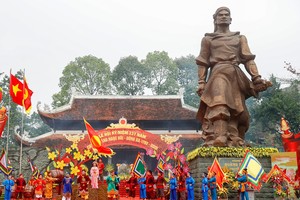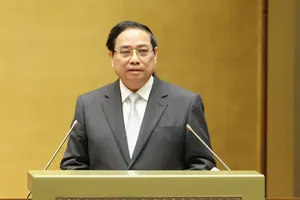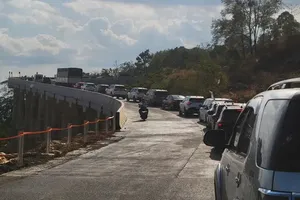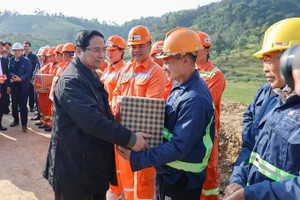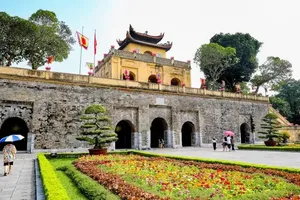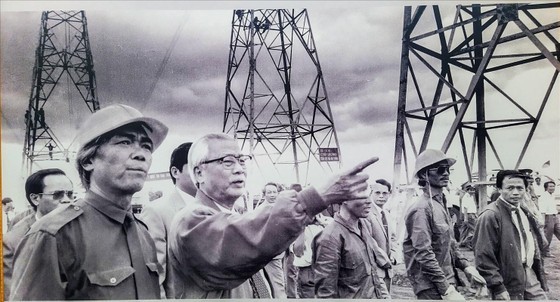 |
| Prime Minister Vo Van Kiet directs the construction of the North - South 500kv transmission line. |
Mr. Vo Dai Luoc, an associate professor, and former member of Prime Minister Vo Van Kiet Economic Advisory Group, recalls his memorable time spent with the late Prime Minister in vivid recollections. Mr. Vo Dai Luoc recalls that the late Prime Minister was very sensitive to practical issues, and when he was convinced of an effective solution to a problem, he made decisions immediately. On occasions when the late Prime Minister had to sign important documents, he always consulted all members of his Economic Advisory Group (EAG), of which Associate Professor Vo Dai Luoc was an important member.
Staying grounded
I recall that during one meeting with the late Prime Minister Vo Van Kiet, an EAG member suggested banning fireworks during Lunar New Year celebrations. At that moment the late Prime Minister was seen jotting down a few words on his notepad. After that, he consulted various groups across the country and then issued a total ban on fireworks. Another instance of his decisive nature was seen in the case of the construction of dikes. Some people had built houses at the foot of the Red River Dike, causing the dike to become weak as termites began to feed on the wood portions of the houses. During a meeting with EAG, late Prime Minister Vo Van Kiet listened to members and after extensive consultation, he ordered that all houses along the dike be demolished.
The late Prime Minister Vo Van Kiet also showed how decisive he was on another occasion when he made a firm decision to build the North-South 500 kV transmission line to improve the national grid. Along with General Secretary Do Muoi he decided on this matter. This is why Politburo approved the proposal although Mr. Dang Huu, the then Minister of Science and Technology, had objected strongly to the plan. General Secretary Do Muoi had previously been Minister of Construction and also Deputy Prime Minister, so he was consulted on 80 percent of all economic issues.
Late Prime Minister Vo Van Kiet was well aware of this fact and called me to assign the task of conveying his idea to General Secretary Do Muoi and talk him into agreeing to the plan. I had been a private but unofficial consultant to General Secretary Do Muoi in the anti-inflation program earlier, so I was able to understand General Secretary Do Muoi and finally convince him of the plan.
At times, some people would criticize the late Prime Minister Vo Van Kiet for his economic policy, saying that he was deviating from the country’s socialist agenda. Mr. Tran Duc Nguyen, EAG Head, assigned me to prepare a presentation to argue against this point of view.
In my presentation, I pointed out a few key points. I stated that firstly when assessing whether the economy is on the right track towards socialism, we should not only consider whether the group of state-owned companies is higher than private companies. We must look at the growth rate and efficiency of the entire economy. If state-owned companies make up a larger portion, but growth is stagnating and the economic efficiency rate is low, then it is far from making progress on the road to socialism. In fact, the growth rate was high at that time, and the economic efficiency had increased significantly when the late Prime Minister Vo Van Kiet was holding the reins.
Secondly, before the economic reforms known as ‘Doi Moi’ in 1986, state-owned companies accounted for 90 percent of the economy, and household or private businesses made up only five percent. A lot of people thought Vietnam was a socialist economy, but it was in deep recession and suffered hyper-inflation, which was at times over 700 percent. I only talked for about ten minutes about the present situation, and the late Prime Minister Vo Van Kiet listened very attentively. Then, during a Politburo Standing Committee meeting to discuss ways to pull the economy out of depression, the late Prime Minister Vo Van Kiet spoke for half an hour to affirm that Vietnam had not deviated from the path of socialism.
Opening the economy
The question of how to effectively open the economy and pave the way for global integration was a heated debate when late Prime Minister Vo Van Kiet was in office. At that time, the Politburo members were strongly against the idea of international integration. Late Prime Minister Vo Van Kiet assigned me the task of making the idea clear to General Secretary Do Muoi. After I spent several hours explaining the advantages and disadvantages of international integration, General Secretary Do Muoi totally agreed to the proposal and asked me to find ways to persuade Politburo to approve this proposal. He assigned me as a scholar to make a convincing presentation to the Politburo members.
Before the Politburo, I stated that firstly, although the international organizations were established by capitalist countries, all their principles are made known to the public, and none of these principles are against the development of our country as a socialist state. Therefore, their business activities can still ensure fairness and the interest of our nation. Secondly, these international organizations have actually been benefiting from all the participating countries, and it is not difficult to see that.
Thirdly, if we don't join these organizations, we will be isolated and left alone to resolve our problems on our own, like in the early 1980s. At that time, Foreign Minister Nguyen Manh Cam and Trade Minister Le Van Triet had each talked about their points of view for about half an hour from diplomatic and commercial perspectives. Finally, Politburo decided that Vietnam would join ASEAN, APEC, and WTO, and normalize diplomatic relations with the US. It is without a doubt that the late Prime Minister Vo Van Kiet made great contributions to the country and in the move into the international arena.
Late Prime Minister Vo Van Kiet once visited Singapore, and highly appreciated the achievements made by Singapore. He said such achievements in Singapore largely resulted from effective management and huge contributions from Prime Minister Lee Kuan Yew. Later, the late Prime Minister Vo Van Kiet personally invited Mr. Lee Kuan Yew, who was Adviser to the Minister and no longer the Prime Minister of Singapore, to join him as his adviser, to which the Politburo disagreed.
Late Prime Minister Vo Van Kiet said to the EAG that even though now Politburo does not agree for Mr. Lee Kuan Yew to be his adviser, he will still act as an adviser to EAG. After that, each week, we listened to Mr. Lee Kuan Yew speak in three or four sessions about his management and governance experiences, and then we presented reports to the late Prime Minister Vo Van Kiet.
Today I still remember what Mr. Lee Kuan Yew said almost 30 years ago which is still of great value to us. Late Prime Minister Vo Van Kiet was a dynamic man who always seriously heard all constructive opinions and weighed the pros and cons of what to do to maintain positive economic growth in Vietnam.
Asso. Prof. Vo Dai Luoc, Former member, Prime Minister Vo Van Kiet Economic Advisory Group

